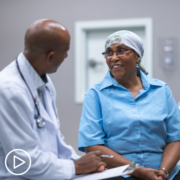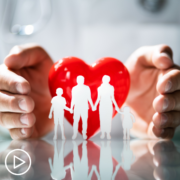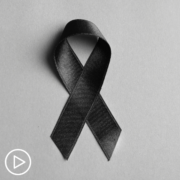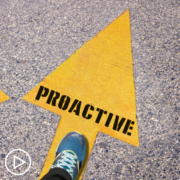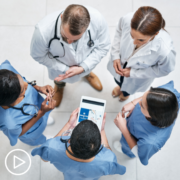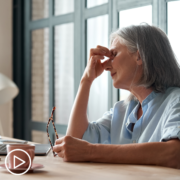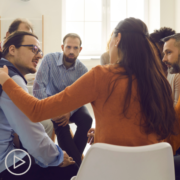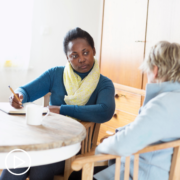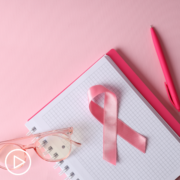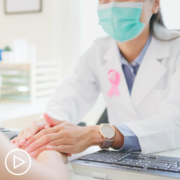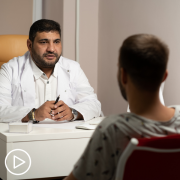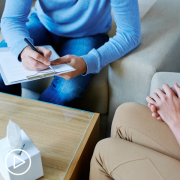How is survivorship defined, and what can one expect after cancer treatment is complete? Dr. Kathleen Ashton, a clinical health psychologist, shares key advice about what to expect in follow-up care and the importance of planning for the future. Dr. Ashton is joined by Erica Watson, a breast cancer survivor, who provides her personal perspective on navigating life with cancer, discusses the impact of peer support, and shares why she’s passionate about patient advocacy.
Erica Watson is a breast cancer survivor and patient advocate.
Related Resources:
Transcript:
Katherine Banwell:
Welcome and thank you for joining us. With us today is Dr. Kathleen Ashton. Dr. Ashton, welcome. Would you please introduce yourself?
Dr. Ashton:
I’m Kathleen Ashton. I’m a board-certified clinical health psychologist, and I specialize in working with patients with breast cancer and those with hereditary risk for breast cancer.
Katherine Banwell:
Erica, would you introduce yourself?
Erica Watson:
Sure. I am Erica Watson, wife, mother, grandmother, neighbor, friend, employee, sister, aunt, all those in addition to a, I’m going to say six-month breast cancer survivor.
Katherine Banwell:
Congratulations.
Erica Watson:
So, thank you.
Katherine Banwell:
Well, welcome to both of you. We really appreciate you taking the time to join us. Erica, I’d like to start with you. When were you diagnosed with breast cancer?
Erica Watson:
So, I got the official I have cancer, or you have cancer call on the 28th of February 2023. So, a little over a year ago.
Katherine Banwell:
And how did you work with your team to decide on a treatment plan once you were diagnosed?
Erica Watson:
Initially I went into my first appointment just automatically knowing that I was going to have a double mastectomy, because I just could not imagine having to go through any part of this process ever again. But then I settled, I listened to my medical team, we settled on doing chemotherapy first and then I made the decision on what type of surgery to have about a month-and-a-half to two months later.
They allowed me to make the decision. And so, I didn’t feel any pressure or anything like that from them. So, it was really me listening to my medical team.
Katherine Banwell:
Okay. And how are you feeling today?
Erica Watson:
I’m good. I had my three-month appointment with my oncologist yesterday. I got a gold star on my blood work, it’s looking great. I’m good, I’m good.
Katherine Banwell:
That’s such great news.
Erica Watson:
Thank you.
Katherine Banwell:
Dr. Ashton, I’d like to start with a definition. If you would tell us what the difference is and the importance of survivor versus survivorship?
Erica Watson:
Sure. So, people define being a breast cancer survivor at different points along the way, and even different oncologists really think about it, dating it from different times. So, some people date it from when they were diagnosed. Other people will date survivorship from after they had their surgery or after they completed chemotherapy.
So, everyone looks at it a little bit differently. But survivorship is really more of that process throughout someone’s life after breast cancer; taking care of surveillance, working with their doctors, ongoing lifestyle changes that they may be undergoing after breast cancer.
Katherine Banwell:
And, Erica, what does survivorship mean to you?
Erica Watson:
I am just living with a purpose now, I guess. I have not defined where my survivorship term starts or ends or starts actually. So, I’m intentional about laughing more and doing things that bring me joy and sharing my story.
I try not to pay attention to the small things in life that used to get me all stressed out. I talk to my medical team, I ask questions, I dance in the mirror when I hear good music. I mean, I’m just trying to get the most out of life that I can at this point. And I wake up every day with gratitude, and I just go.
Katherine Banwell:
Yeah. Do you feel like you’ve had to adjust to a new normal?
Erica Watson:
Oh my gosh, yes. I tend to, I guess I’ll say question things a little bit more than I did in the past, and specifically as far as my medical team; I’ll ask if I can do a thing or another with traveling, whether or not I can exercise or sit in the sun.
I have to pay more attention to my body. I have to pay more attention to the things that I eat, those kinds of things. Which I really didn’t pay too much attention to in the beginning, but breast cancer is a part of my life and will be a part of my life. It does not define my life, but it is a part of it, and I have to pay attention to that.
Katherine Banwell:
Dr. Ashton, the next question goes to you. We often hear about the importance of creating a survivorship care plan. What is that exactly, and where do you and a patient start when you’re creating such a plan?
Dr. Ashton:
That survivorship care plan is such an important part of the process. I think for many patients it really helps relieve a lot of anxiety. When you’re finished with your active treatment, there’s really a thought of what next, right?
You’ve just gone through surgery or chemotherapy, radiation; you’ve been actively treating the cancer, and then you’re kind of left like, what is this new normal? So, one of the things we do at the Cleveland Clinic is patients have a survivorship visit.
So, it’s either with their oncologist or with a nurse practitioner, and they spend an hour with the patient and go through what are all the treatments you’ve done? What’s your plan for the next five years? How often do you come in to see your doctor? What kinds of tests are you going to get, what kind of scans? What you need to be looking for? What would be a sign of something to be concerned about? And then a big part of that plan is also the lifestyle changes that occur in survivorship. So, eating a healthy diet, exercising regularly, stress management, getting enough sleep. And that’s where as a psychologist a lot of times I come in.
We have a group called Breast Cancer STAR (Survivorship Tools and Resources), so it’s a five-week program for our survivors to work on changes with lifestyle, stress management, all of those changes in their life moving forward.
And that’s a virtual group program where survivors can talk to each other about that survivorship plan as well as learn some skills to take with them.
Katherine Banwell:
It’s great to have that support. We know that this varies by cancer, but what is the typical follow-up that occurs when monitoring for recurrence?
Dr. Ashton:
So, I usually would probably leave that question to the oncologist, and so many different kinds of breast cancer are going to have different kinds of monitoring. But very often that first year patients will check in with their oncologist every three months. They’ll have a breast exam at many of those visits. If they still have breast tissue, then they would have mammograms or possibly MRI’s. So, there’s some scans that go along with that. And many patients are also on ongoing medications or treatments that go for sometimes several years after their initial breast cancer diagnosis.
So, they would be checking in with their oncologist on those medications at each visit as well.
Katherine Banwell:
Erica, the follow-up care that goes along with being a survivor can be anxiety-inducing, or cause some call it scan-anxiety. What advice do you have for coping with these types of emotions as a survivor?
Erica Watson:
As a survivor I will have my first scan next month, but I would just encourage survivors to just be okay with the process, ask questions, as many questions as they possibly can, take someone with them, which was suggested to me.
I don’t have anxiety necessarily about the scans. My breast cancer was detected by pain or through pain, so I experienced anxiety with that, any kind of breast pain that I experienced from surgery or radiation therapy. And I also would just advise the patient or survivor to just experience the process, allow themselves to be afraid, talk through the reality of what’s really going on, talk through the fact that they had all the treatments, they did everything that was in their control as far as going to the appointments, getting all the care, to stop the reoccurrence.
Katherine Banwell:
Right. Dr. Ashton, what can you tell us about the importance of peer-to-peer support in cancer care and survivorship?
Dr. Ashton:
I think peer-to-peer support is so important for survivors.
It really gives survivors the chance to talk with other people who really understand what it’s like going through this process. So, as a professional, I can tell patients the science and give them tools and what works, and their oncologists can tell them what’s important for them to do, but the lived experience is so important. So, in our group program they get some of that peer-to-peer support. And when Erica says, “Hey, it really helped me to bring someone with me to my scan,” a patient really hears that in a different way than when your professional tells them.
So, it’s just that much more meaningful. There’s another program at the Cleveland Clinic called Fourth Angel, and it’s a national program that any patient can take advantage of, and it matches you with a peer mentor.
And they often check in by phone with each other, someone who’s been through a very similar experience, and patients often find that incredibly helpful. And many patients that move into survivorship, then they become a mentor, and they’re able to help another patient.
And that really feels good to be able to give back in that way.
Katherine Banwell:
Yeah, that’s wonderful. Erica, you have a family history of breast cancer, so you’ve been really vigilant in your care over the years. What advice do you have for other patients and family members facing a cancer diagnosis? Where do you find your strength?
Erica Watson:
Well, I got it from a handful of sources. I learned a lot on my faith. I talked to my family members who were diagnosed with breast cancer and that are currently living. I was not afraid to ask questions. I cried a lot. I just really leaned heavily on my medical team.
I feel like it is so important as Dr. Ashton was saying to be able to reach out or connect with someone that has actually lived the experience, because I was one of those women. I heard it from the medical team, but they were leaning on science, and I needed someone that actually went through what I was going through. That allowed me to understand and to trust what they were telling me. Not that I didn’t trust my medical team, but the family members or anyone else that I leaned on to support actually lived the life that I was getting ready to live, experienced what I was getting ready to experience. So, that really helped me a lot.
Katherine Banwell:
Yeah. As you navigated care, were there any obstacles or hurdles that you faced?
Erica Watson:
Well, the main one that sticks out to me today was as an African American woman, I didn’t feel as if I had a lot of resources that were catered to me and my needs. And so, that kind of stifled my search for research or for resources, because I didn’t have an experience with women that looked like me, that talked like me, that lived like me, that would have experienced the hair loss like I experienced, my skin changes with the sun.
So, those were the obstacles that I faced, and it was tough. Of course, I had my family to lean on, I have my aunt, my sister, but there are so many women out there that don’t have family members that have gone through breast cancer, and I feel so like it’s necessary for us to be able to see and to experience the diversity in that area.
We make up a huge demographic, but we are just not represented the way that I feel like we should.
Katherine Banwell:
Yeah, I absolutely agree. And I know that the medical community is trying to reverse this issue; they’re trying to make it easier and more supportive for people of all colors and races. Why do you think it’s important for survivors to actually be an advocate and help other people as they navigate cancer?
Erica Watson:
I believe the most important reason is just so that they know that they’re not alone. We can, as a breast cancer survivor, I know it was – my first response was to just go into a shell and hide.
I didn’t want to share it with anyone. Of course, my family did not, they would not have understood, and this was before reaching out to my sister and my aunt. But yeah, just so that we’re not alone, to know that there are other women out there that are experiencing and feeling the exact same thing that we are experiencing and feeling; the questions, the concern, the guilt, the fear, we just need to be able to know and connect in that way. So, I just – yeah, I’m so passionate about that, and that’s it.
Katherine Banwell:
Yeah. It’s so helpful to know you’re not alone in how you’re feeling, in some of the symptoms you’re having, to know that other people have experienced the same thing is vital.
Dr. Ashton, primary and preventative care continues to be essential regardless of someone’s diagnosis. What tips do you have for keeping up with overall health and well-being?
Dr. Ashton:
Yeah, I think as women we often put ourselves last in the priority list. And for breast cancer survivors, well-being is incredibly important. And I tell patients it’s not an optional thing or something that you’re being selfish by doing, it’s actually part of your prescription as a survivor. So, the time that you take for stress management, whether it’s meditation or being outdoors or whatever brings you joy, is really part of your prescription for wellness in survivorship. Exercise is incredibly important. They recommend for survivors 150 minutes of exercise a week and two days of weight training, keeping your weight normal.
So, all of the healthy eating, healthy habits are actually what’s going to help prevent recurrence. And they’re things that are in patients’ control, so that feels good too to be able to take that time and recognize that it’s an essential part of their health, not an optional part.
Katherine Banwell:
Erica, what advice would you give to someone who is newly diagnosed with cancer?
Erica Watson:
I would tell them to process, take some time, slow down, trust family members and friends, listen to their medical team, know and realize that they are not alone, seek resources, and just to know that it’s not their fault, because I dealt with a little, a smidgen of that in the very beginning of my diagnosis. And to understand that there is, that today’s breast cancer is not yesterday’s breast cancer; it looks different, it feels different, and that they can do it.
That is something that is vital. I believe that we – I know when I was first diagnosed, I remember looking in the pamphlets and hearing stories, and I just knew that there was no way that I was going to make it. I couldn’t do the sickness, I didn’t want to deal with the hair loss, all the things; I didn’t want to do with the pain, all the things that came along with a breast cancer diagnosis and treatment from chemotherapy, radiation, or surgery, but it’s not like that today. And so, I just would encourage the survivor or the patient to just be aware, do research, but don’t Google as much research, because it’s not a lot of good information on Google; it will definitely scare you.
Katherine Banwell:
No, that can be dangerous.
Erica Watson:
Yes, it will, it will scare you. But most of all, lean on family members and friends, ask for help, which is something that I did not do initially, because I am a woman and I can do it all on my own, and that didn’t work out well for me in the beginning. But just seek guidance, just reach out to someone that they know, advocate, any kind of mental health resources that are offered through the hospital or even in the community through nonprofit organizations, to do all those things. And Dr. Ashton has really encouraged me and pushed me to think of myself, to put myself first and understand that breast cancer or cancer in itself is a disease.
It’s sickness, it needs to be treated properly, and that’s what I would give them.
Katherine Banwell:
Yeah. I want to thank both of you so much for joining us. And do you have anything else to add?
Erica Watson:
Well, I’m very excited to hear Erica’s point of view as she goes through this process, and excited for her to share her experience as an African American woman. I think absolutely as healthcare providers in the system we need to do better, and I know her reaching out in this way is going to make a difference for someone listening to her story who is thinking about getting a mammogram or is starting to go through treatment. So, I just appreciate her today.
Katherine Banwell:
Yeah. Erica, do you have anything to add?
Erica Watson:
I just want to thank Dr. Ashton. I want to thank you. I just want to thank – I’m grateful and honored for the opportunity to be able to share my story. I am a true believer, and if it helps one person then that’s mission accomplished.
And I believe in locking arms and let’s just, accomplishing the goal and fighting this fight together.
Katherine Banwell:
That’s a great way to end the interview. Thank you both again so much, it’s been a pleasure.
Erica Watson:
Thank you.
Dr. Ashton:
Thank you.

